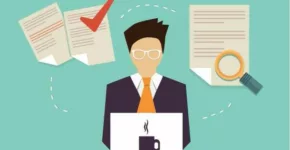What connects pupil’s essay, student’s course paper or doctor’s dissertation? The fact that all these papers can be accused of plagiarism. Plagiarism is the purposeful appropriation of other people’s thoughts and other intellectual components. You may ask – “If I rewrite the quote in my own words, will this also be regarded as plagiarism?”. Yes, regardless of whether you use direct quotation or indirect (rewriting excerpts of someone else’s material literally or in your own words), it will be counted as deliberate copying of someone else’s thoughts. Thus, the principal rule to avoid plagiarism troubles is to always keep in mind the quoting and specify the author and / or the source.
“To steal ideas from one person is plagiarism; to steal from many is research.”
― Steven Wright
What is plagiarism?
Plagiarism is “wrongful appropriation” and “stealing and publishing” of another author’s “language, thoughts, ideas, or expressions” and the representation of them as one’s own original work. Therefore, plagiarism is considered not only a verbatim copying of other people’s thoughts, but also their close imitation. Bear in mind that “Ah, I will read and rewrite in my own words” is not an excuse. Here and now you are engaged in plagiarism. To avoid this unpleasant situation, you need to express your own opinion on the topic, based on another text, and indicate the source. Thus, other people’s ideas will not be your main source, but they will serve as an important addition to your own thoughts.
How to prevent yourself from copying?
Be acquainted with the issue. If this is a well-known topic for you, it will be much easier to write something by yourself, instead of resorting to plagiarism by copying other sources. Find the information on the topic online or in books. Please note that when searching for information on the Internet, use only trusted and authoritative sources.
Read several sources. The best way while searching for the information is to use not only one source, but a few. If you rely only on one channel, the probability of unintentional copying will grow, since to think something up will be much harder. You do not even realize that you are copying something. Phrases from another source will involuntarily fit into your head. To avoid it, try to find a few articles, a documentary, a book and then it will be easier to formulate your own opinion.
Make references. Without a bibliography or list of references, your work will look too suspicious. Since, the presence of these sections is a must. When quoting or paraphrasing, cite the source immediately. If you postpone citing, you risk to forget about one of them and end up in trouble.
If you believe that a unique phrase can be regarded as a copied one, use quotation marks.
The danger of plagiarism
What is bad in plagiarism? Not only your work can be rejected or your rating reduced. For plagiarism there is a legal liability, thereby the author has power to sue you. If a verbal copying of someone else’s text without an author’s name takes place, there is almost no chance to win the case.
In legal practice, there is a concept of unintentional (subconscious) plagiarism. In this type of copying was accused George Harrison, who in the song “My Sweet Lord” coincidentally used the melody from the song of the group The Chiffons – “He’s So Fine,” and was forced to buy it.
What you do not need to write in the footnotes?
After reading this article, an obsessive fear of plagiarism appeared? Calm your heart, not everything is needed to be cited. Here are the cases when it is superfluous:
● Well known facts, historical facts such as the date of beginning of the Second World War, folklore, local legends.
● Your own music and other multimedia products you created.
● Your experience, creations and insights.
● The scientific evidence obtained from your own experiments, polls etc.
● If copying cannot be avoided, do not replicate the whole passages word-for-word. The best way is to replace the majority with your own words, quoting the copied part. Then, cite everything in the bibliography. Blablawriting.com plagiarism checker will help you with the right citation.
● Note, while paraphrasing you cannot calk verbatim more than two words in a row from your source. Otherwise you will need to put quotation marks.
● If you write tirelessly by yourself, the possibility that you will be accused of copying is small, but if you ask someone to write for you, or use unreliable custom writing services, the chances of being revealed sharply increase.
● If you are quoting something, make sure you copy a quote verbatim.
● Even if you honestly express your opinion, indicate that you came to it by yourself. Otherwise, if that sounds too good, your teacher might think that you copied it.
● Use special online services for checking plagiarism. In such a way, you can quickly check your work and soothe your nerves.
● To make it easier to arrange everything in your own words, use Google Translator. Translate the article from one language to another couple of times, for example, English-Spanish-German-English. In the end you will get an article in broken English, and using the background information you have been thoroughly looking for, rewrite the article in a clear language.
● When writing, indicate the source where you took the information at once. Later you can forget about it, and it will be treated as plagiarism.
● If while writing your statement appears a feeling that you’ve already heard it somewhere, most likely it is true.
“People seldom improve when they have no model but themselves to copy after”
― Oliver Goldsmith
Plagiarism is nothing but theft of intellectual property. You take a great risk by deliberately copying someone else’s material. It can undermine your reputation. When studying at school the cost is a mark, at university you can be expelled for intentional copying. For scientists, musicians, directors, regardless of what area they are involved in, copying will make a negative image and may even worth them a name.








